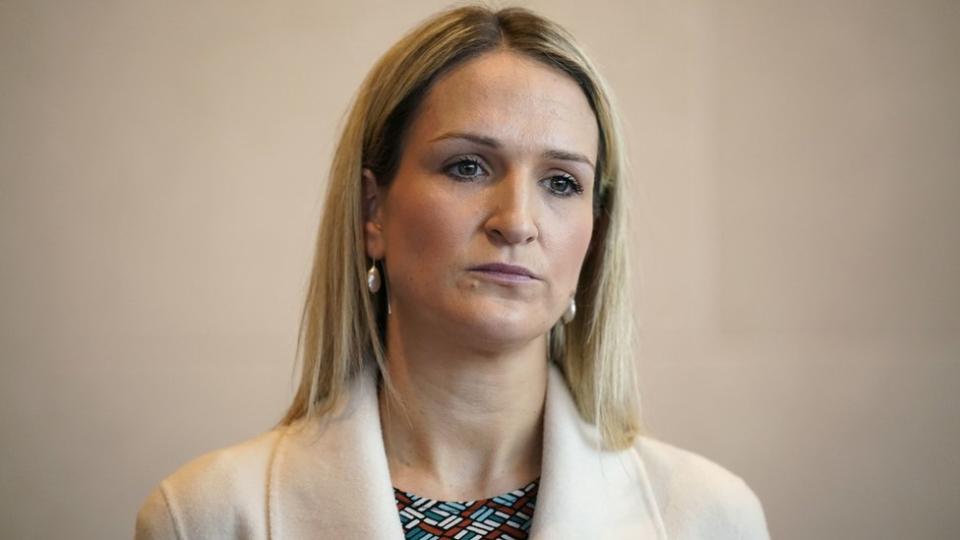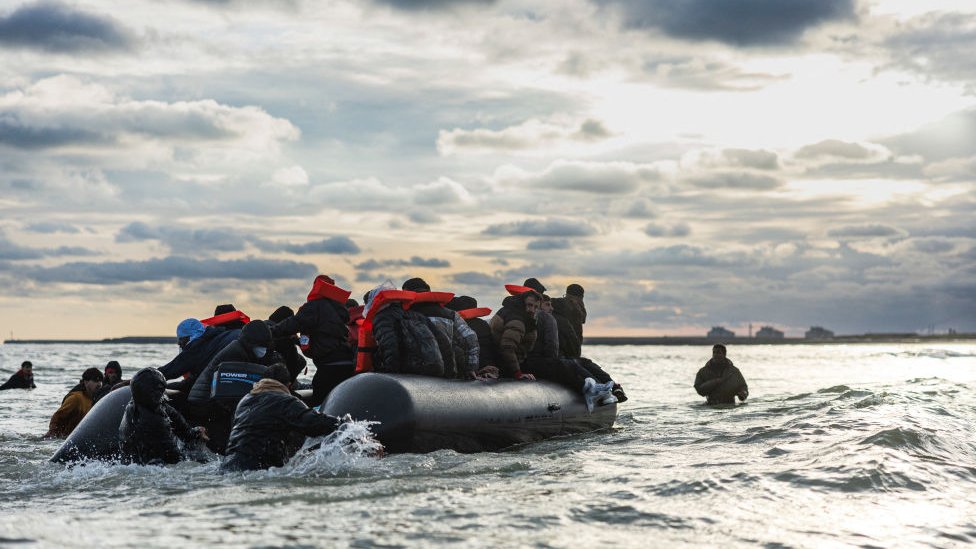The UK government will not take back asylum seekers who have crossed into Ireland until EU-wide asylum rules are changed, Downing Street has said.
Last week, the Irish government announced emergency laws to return a rising number of asylum seekers crossing from Northern Ireland.
But the PM’s official spokesperson said it was up to the UK “to decide who we do and do not accept into the country”.
Irish and UK ministers met on Monday to discuss the asylum system.
The prime minister’s official spokesman said: “Clearly, we are not going to start accepting returns from the EU just as the EU does not accept asylum returns from the UK to France.
“Even if Ireland was to pass legislation, it is up to the UK government to decide who we do and do not accept into the country.
The Irish government says it is seeing an influx of asylum seekers coming from Northern Ireland because they are “fearful” of being sent to Rwanda.
And it says it will not allow Ireland to provide a “loophole” for anybody else’s “migration challenges”.
Ireland’s deputy leader Micheál Martin denied the row is developing, but a scheduled meeting between Home Secretary James Cleverly and Irish Justice Minister Helen McEntee was postponed at short notice late on Sunday night.
But the asylum system took centre stage at a pre-arranged meeting taking place on Monday between Mr Martin and Northern Ireland Secretary Chris Heaton-Harris.
The meeting of the Intergovernmental Conference, which was established under the Good Friday Agreement and has met regularly since.
Following the meeting Mr Heaton-Harris said “in no way [do] we want to upset our relationship with Ireland” on asylum claims.
But he added that since Brexit, the UK has been directed to “deal with the EU as a whole entity” – and that is the government’s current approach.
The UK government was still committed to “protecting” the Common Travel Area (CTA) agreement, which allows free travel between the UK and Ireland, “from abuse” by asylum seekers.

Mr Martin said the emergency laws were not an attempt to alter the current agreement with the UK.
Instead they were to “legislate for the decision” taken by the Irish High Court, which found that Ireland could not designate the UK a “safe third country” and return asylum seekers because of the threat they would be sent to Rwanda.
Ireland has said 80% of recent asylum seekers arrived from Northern Ireland – but did not specify how this number was determined.
Ms McEntee said that so far this year a significant majority of people seeking asylum in Ireland had applied at an international protection office and not at a port or airport, which pointed to people coming from the UK via the land border.
BBC Verify could not find any published figures about the 6,000 migrants the Irish government say crossed into Ireland this way and asked the Irish government.
It did not provide figures but said its “firm assessment, based on the experience of staff and others working in the field, and based on the material gathered interviews, is that in most cases those applying for the first time in the IPO have entered over the land border”.
Prime Minister Rishi Sunak has argued that any increased flow of people into Ireland shows that the Rwanda asylum policy, which became law last week, is already working as a deterrent.
On Sunday, Taoiseach (Irish prime minister) Simon Harris said he would not “allow anybody else’s migration policy to affect the integrity of our own one”.
He said he had asked Ms McEntee to bring legislation to cabinet on Tuesday that would enable asylum seekers to be sent back to the UK.
The UK government is paying £500m to fund more border patrols to prevent small boat crossings to the UK, and a new detention centre in France, following a new deal between the two countries in 2022.
However, there no specific agreement allowing the UK to return asylum seekers to France once they have crossed the channel.
Rwanda deterrent
Ireland’s planned legislation follows an Irish High Court ruling that Ireland could not designate the UK a “safe third country” and return asylum seekers because of the threat they would be sent to Rwanda.
Nick Henderson, chief executive of the Irish Refugee Council, said he believes there may be a connection between UK policy changes and an increase in people seeking asylum in Ireland in the last two years.
In an interview with BBC Radio 4’s Today programme, Mr Henderson said it is “unclear” whether the new law “would be sufficient to get around the problems identified by the judge”.
Many of those entering the UK illegally in recent years have arrived via crossings in small boats from France.
In 2023, a total of 29,437 people entered the UK through this route.
And Home Office figures show more than 7,000 migrants have arrived in the UK so far this year after making the journey – reaching a new record high for the first four months of a calendar year.
Under the Rwanda policy, anyone arriving in the UK illegally will be deported to the east African country and given the option to claim asylum there.
The plan was approved by Parliament last week, after months of political wrangling and legal challenges. The government has said it plans to see the first flights take off within 10 to 12 weeks.
The Home Office confirmed late on Sunday that migrants would start to be detained in the coming weeks in preparation for the first flights to Rwanda.
It came after the Guardian reported that the detentions were set to begin on Monday.
